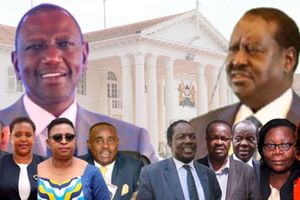
President William Ruto (left) and former Prime Minister Raila Odinga at the Raila Odinga Stadium in Homa Bay County on December 27, 2024.
The new Kenya Revenue Authority (KRA) board chairman Mr Ndiritu Muriithi is rooting for a formal coalition agreement between President William Ruto and opposition leader Raila Odinga.
Mr Ndiritu, who was sworn into office on Monday, says the agreement would help chart a common path for Kenya Kwanza administration and Azimio la Umoja coalition, foster unity and peace in the country and play a key role in delivery of development to Kenyans.
Despite joining President Ruto’s government through his allies whom he ‘donated’ to Kenya Kwanza, the former Prime Minister has maintained that his Orange Democratic Movement (ODM) was still in the opposition, drawing sharp criticism.
Narc-Kenya leader Martha Karua has particularly accused Mr Odinga of betraying Kenyans by joining Dr Ruto instead of staying in the opposition to check the government.
After protests that rocked the country in June against Finance Bill 2024, President Ruto was forced to drop the laws and fired his entire cabinet. He roped in Mr Odinga’s men into the government in a bid to quell the discontent in what he referred to as ‘broad based’ government.
Then two weeks ago, Dr Ruto named former President Uhuru Kenyatta’s allies to take Cabinet positions, parastatal heads and ambassadorial positions in his administration.
Last Sunday, the President said he would make his government even broader in 2025 in order to make it more “inclusive” with the aim of serving Kenyans better.
Now, Mr Muriithi, who was Mr Odinga’s point man in Mt Kenya region in the run-up to the 2022 General Election, says for full benefits of the unity to be realised, a formal coalition agreement is necessary.
“It should happen like yesterday. As we get into the New Year, a formal agreement will provide harmonised policy framework to guide experts from both sides towards a common goal. Such a coalition would make work easier since it will allow Azimio and UDA to have specific outcomes that we’re trying to achieve for the benefit of Kenyans,” Mr Muriithi told Nation in an interview.
He warned that absence of a pact would risk policy incoherence with disjointed decisions being made, and asked President Ruto, Mr Odinga, former president Uhuru Kenyatta and other principals in the two coalitions to move with speed and formalise the marriage.
He insisted that despite Azimio’s imminent collapse following intention by some political parties to withdraw from the coalition, the remaining entities could still forge ahead.
“I believe that this unity is for the benefit of Kenyans. If you look at the genesis of the broad based government, you realize that it came about following protests by discontented Kenyans. The June 2024 protests and revolt was about the economy and we owe citizens a responsibility to deliver on the promises we make by meeting their expectations,” Mr Muriithi said.
So, what expertise does Mr Muriithi, an economist, bring to the table of President Ruto’s administration?
The second Laikipia governor says he will propose a number of measures that he believes will turn the economy around.
Top among them is widening the tax base, where “the issue should not be for the few people paying taxes to be charged more but getting more people to pay taxes,” he says.
“Widening tax base has a lot to do with providing a conducive environment for small businesses to formalise operations. This can only be achieved by ensuring that the process does not burden traders.”
To stimulate the economy he suggests that since inflation is currently at 2.8 per cent, Central Bank of Kenya (CBK) Monitary Policy Committee should cut the policy lending rate from the current 11.25 per cent to below 6 per cent, as well as reduce the cash ratio for commercial banks from 4.25 per cent currently to 1.25 per cent.
The effect of this, he says, is that lower interest rates will allow traders to borrow at low rates and stimulate economic activities while reducing cash ratio will release about Sh300 billion to the banks for lending.
“Of course someone may argue that this might lead to a devalued Kenya shilling, but a weak currency is not always bad for the economy. The point is that specific and deliberate steps should be taken to stabilise the economy,” he says.
On county governments and how they can increase their Own Source Revenue (OSR), Mr Muriithi says the devolved units have a huge revenue potential.
While the governor of Laikipia between 2017 and 2022, Mr Muriithi put into place structures that led to an increase in the county’s OSR.
In the 2022/23 financial year, Laikipia county recorded Sh1.13 billion compared to Sh903.89 million for 2021/22 financial year which was double the Sh482.15 million collected in the 2015/2016 FY.
After he lost the 2022 election to Mr Joshua Irungu, Mr Muriithi put together a team of experts who are consulting for counties on how to increase their own source revenue.
“For most governors, increasing revenue collection is a headache. But it is not rocket science. What the administrations should do is to link people, services and the revenue collection systems they put into place. You can have an expensive system but collect nothing,” he says.
“Of critical importance is the services counties offer. Some county administrations don’t even know the services on which they are supposed to levy fees and this is what my team of experts teaches them,” he adds.
He says Homa Bay and Kisumu counties are leading the pack, and hopes that the two devolved units will follow the example of Laikipia he set on raising funds.
Mr Muriithi successfully pursued floating of a bond for Laikipia but the funds were not disbursed since parliament had not approved the Treasury guarantee by the time elections were held in August 2022. The Sh1.2 billion infrastructure bond proposal was the first in the country and it attracted a lot of interest from investors.
“Raising funds from investors calls for strict governance and you have to provide evidence of how you’ll repay the money. We went through all the stages which involved ensuring that the books of accounts are properly audited and Treasury gave our financial statements a clean bill of health. By the time I left we were waiting for parliament’s approval and don’t know why the current administration in Laikipia is not interested in pursuing the matter,” he says.
As for whether president Ruto’s administration will embrace his ideas, Mr Muriithi says “what is important is that the President is moving in the right direction by incorporating people he believes can help him deliver to the people of Kenya. I will try to persuade my fellow experts that going into 2025, we need to make tough decisions to turn the economy around.”











